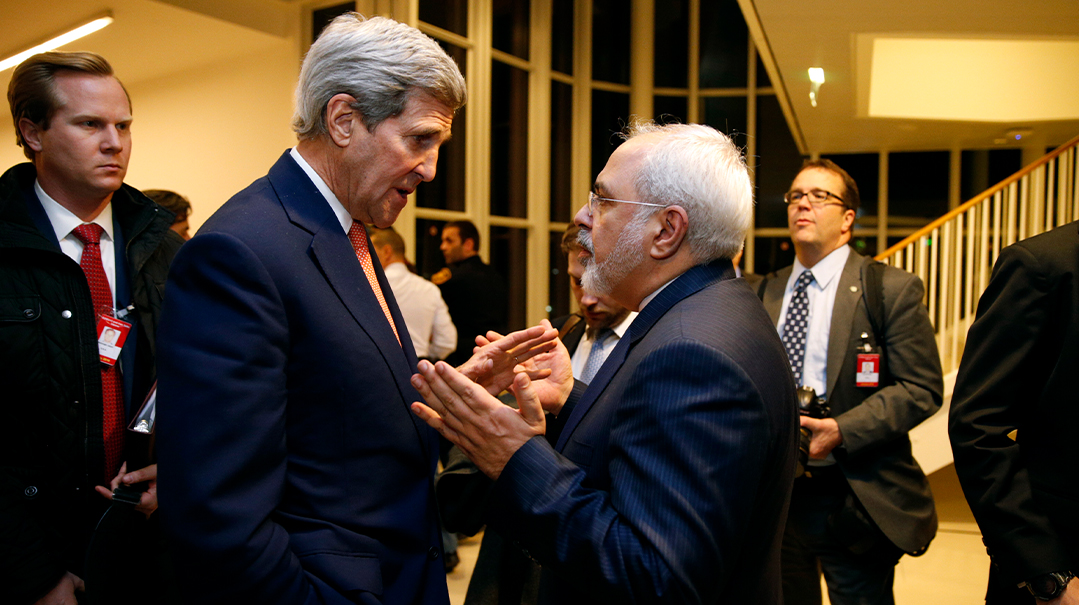The Rush to Rejoin the Iran Deal

The Iranians, still writhing under the crippling sanctions put in place by President Trump, are playing hard to get and don’t want to return to the table

The Biden administration is moving quickly on the Iranian front. In fact, very quickly. Only two weeks ago, talk of returning to the nuclear deal was purely theoretical.
“If Iran comes back into full compliance with its obligations, the United States will do the same thing,” Secretary of State Anthony Blinken said then.
But this week we’ve seen that the administration isn’t just waiting passively for the Iranians, but has changed its approach and is now pushing to reopen talks with Iran.
The Iranians, still writhing under the crippling sanctions put in place by President Trump, are playing hard to get and don’t want to return to the table. But if the Europeans’ brokerage attempts are successful, the path is open for a renegotiation of the JCPOA, the Iran nuclear deal.
President Biden, in a speech at the Munich security conference, said the deal would have to address other issues as well — for instance, Iran’s ballistic missile program and terror sponsorship. But that will come later.
As a first step, the Americans are willing to lift sanctions in return for Iran resuming compliance with the deal. The realization has sunk in that Iran won’t agree to return to the deal first, and the first stage of the negotiations is meant to ensure that both sides simply return to the terms of the original deal.
Okay, that’s stage one — but what do you do about the ballistic missiles and terror activity? Experts in Washington believe that Iran will demand further concessions for this, which could take the form of lifting more sanctions, or other moves. At any rate, it’s hard to see Iran agreeing to this second stage. The Iranians have already said that from their perspective, the ballistic missile program is a red line. In that case, the most likely scenario is a quick return to the original deal, followed by deadlock.
I asked Matt Brooks, executive director of the Republican Jewish Coalition (RJC), and Halie Soifer, CEO of the Jewish Democratic Council of America, for their views on how the US should proceed.
Matt Brooks, Secretary of State Blinken argues that the US leaving the JCPOA got Tehran closer to a nuclear bomb, and that any agreement should address ballistic missiles and proxies. Why don’t you believe that a deal would be the best way to stop Iranians?
Brooks: “The RJC has always been in favor of a deal that permanently ends Iran’s ability to acquire a nuclear weapon, stops its illegal ballistic missile program, and ends its support of global terrorism. What we don’t support is, and will fight reentering, a deal that only delays by a few years Iran’s acquisition of a nuclear weapon, has weak enforcement mechanisms, and does nothing to address Iran’s malign activities. We support diplomacy, like the diplomacy that saw a 200% increase in the number of Muslim nations recognizing Israel. What we don’t support is appeasement.”
Halie Soifer, Republicans are making the point that the Iranians are not acting in good faith and are trying to dictate conditions for the US to return to the JCPOA. They argue that the US should take an aggressive approach and not rush to get back into the agreement. What do you think?
Soifer: “President Biden is committed to ensuring Iran does not acquire a nuclear weapon, and has indicated that if Iran returns to compliance with the JCPOA, the United States is prepared to engage in discussions about the deal. The Biden administration also aims to strengthen and lengthen the original agreement to address other areas of concern beyond the nuclear program, including Iran’s nefarious behavior in the region, as well as its ballistic missile development and proliferation. Finally, the Biden administration recently announced that it’s rescinding the Trump administration’s failed effort to ‘snap back’ sanctions at the UN, which isolated the United States, not Iran. Trump’s ‘maximum pressure’ strategy toward Iran led to minimum results, other than Iran moving closer to acquiring a nuclear weapon. Biden wants to reestablish the limits and constraints on Iran’s nuclear program as soon as possible.”
(Originally featured in Mishpacha, Issue 850)
Oops! We could not locate your form.













